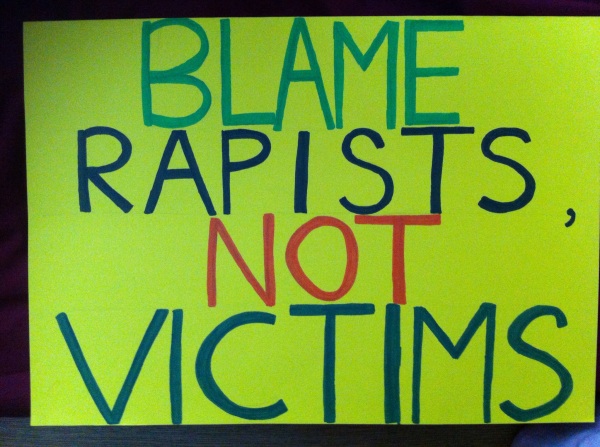
My placard for the day
On 24 January 2011, a Toronto police officer gave a talk on crime prevention. When speaking about rape, he uttered the now infamous words, “Women should avoid dressing like sluts.” Enraged at his words and the culture of victim-blaming it reflected, Canadians marched to let everyone know that women’s clothes were not responsible for rape; rapists were. Although it was a Canadian police officer who had made those comments, the rape culture that gave rise to the sentiment was not confined to Canada. Women from around the world recognised it, shared their outrage, and have joined in the movement, with Slutwalk protest rallies popping up in more than 40 countries so far.
From the start, Slutwalk has been controversial, even among feminists. Some seek to reclaim the word ‘slut’, to redefine it to mean a sexually liberated woman, instead of a judgmental term used to cast aspersions on the morality of the woman to whom it is addressed. Still some wish to use the word to include all women, to demolish the idea that some women are more valuable than others based solely on a patriarchal notion of feminine purity. I’ve heard it said that “if we’re all sluts, then the term can no longer be used to divide us.”
However, many feminists, myself included, find the reclamation of the word ‘slut’ to be deeply problematic. We could insist on its redefinition, refuse to see it as an insult, but I don’t think it is possible to wipe the slate completely clean. Regardless of what we might say, sexist people will continue to use the word as an insult, and even when not intended to be used as such, historical connotations will hang off it, baggage reminding us of and reinforcing our oppression. Personally, I think the word ‘slut’ should be wiped from our vocabulary, ideally together with the words ‘virgin’ and ‘prude’. Although they are occasionally used to refer to men, it is common knowledge that women are overwhelmingly the targets of such terms. The very existence of these words places undue importance on a woman’s sexual activity, so much so that it is bound up in her identity. There is no word no describe a person who has yet to learn to drive, no word to describe someone who has never been swimming. Why are we not content with people being able to say, “I’ve never had sex before,” or “I enjoy sex and engage in it frequently?” Why do we see the need to encapsulate their sexual experience (or lack of it) in a label? When applied to women, these identity tags become even more damaging, cementing the idea that women exist as vessels for the sexual pleasure of men, and thus can be viewed as ‘used’ or ‘unused’.
For all that, I decided to attend Slutwalk London yesterday, because Slutwalk is about so much more than the word ‘slut’. While even within the march itself, opinion was divided as to whether we should call ourselves ‘sluts’, there was one thing that everyone could agree on, and that was the notion that the only one responsible for rape was the rapist.
I had never been to a Slutwalk before, and was very moved by the experience. There was a huge turnout, of women as well as a good number of men, bearing placards denouncing the culture of victim-blaming. Here are a few snapshots:
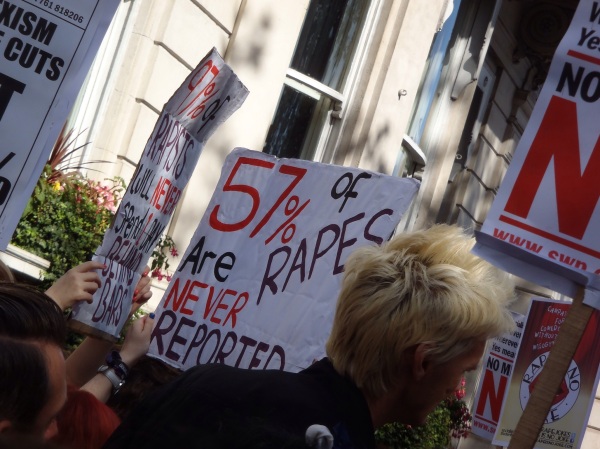
“57% of rapes are never reported”, “97% of rapists will never spend 1 day behind bars”
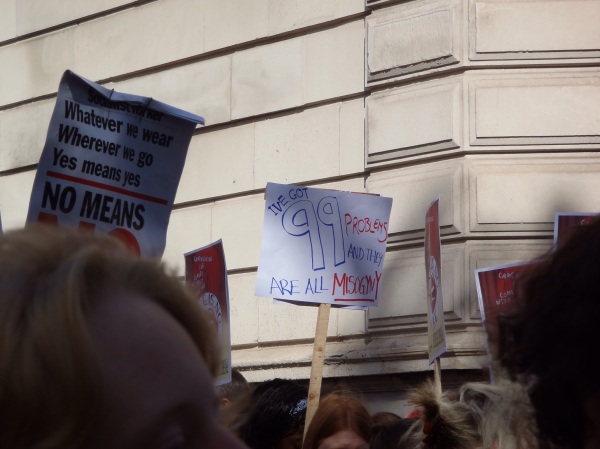
“I’ve got 99 problems and they are all misogyny”
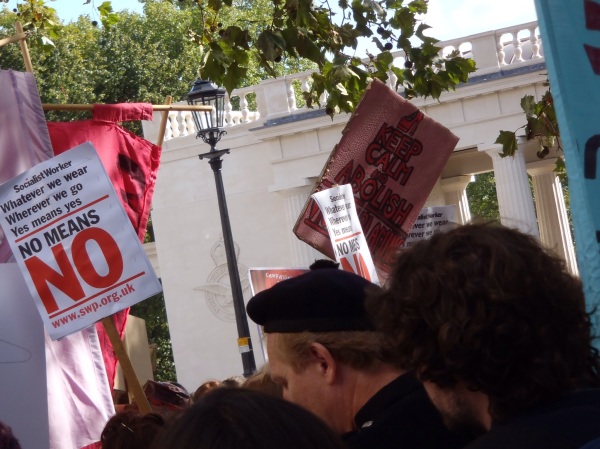
“Whatever we wear / Wherever we go / Yes means yes / No means no” , “Keep calm and abolish victim-blaming”
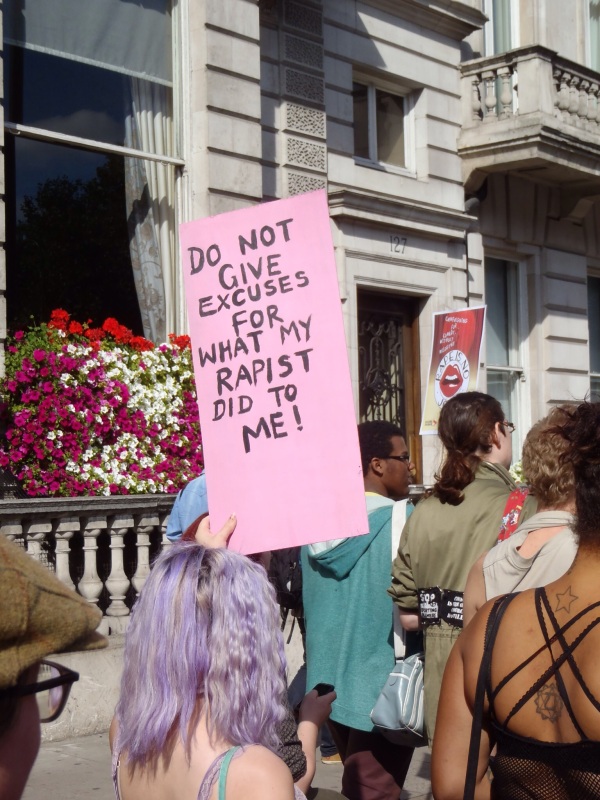
“Do not give excuses for what my rapist did to me!”
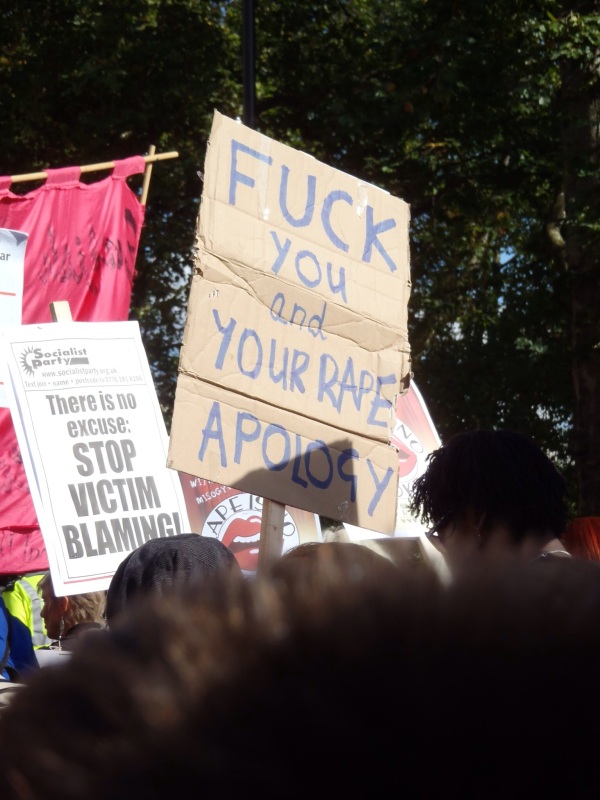
“Fuck you and your rape apology” , “There is no excuse: stop victim blaming!”

“Things that cause rape: (1) Rapists (2) See above”
As we marched, we chanted refrains such as, “Whatever we wear, wherever we go; yes means yes and no means no”; “We’ve said it once and we’ll say it again, no excuse for violent men”; “Two four six eight; stop the violence, stop the rape”, among others. We called to end the shaming of women, to assert that women who wear revealing clothing are not ‘sluts who are asking for it’, and that women who do not wear revealing clothing are not ‘uptight prudes who need a good seeing to.’ We called for the right to dress and have sex on our own terms, not the patriarchy’s. We called for rape cases to be taken seriously by the police and for the public to stop being rape apologists. And at the end of our march, many brave women, most of whom were survivors, shared their stories with us.
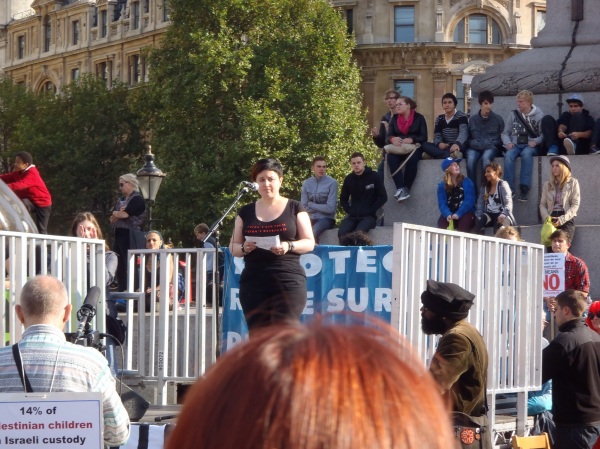
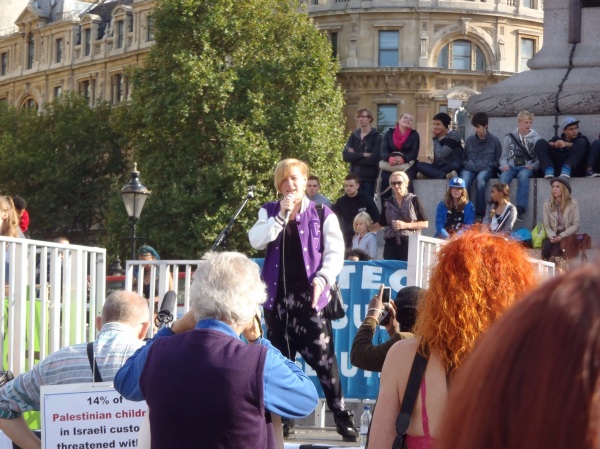
“Don’t Chat to me” – a poem about street harassment
Diversity and inclusivity was the order of the day. We heard the story of young women who had struggled with the justice system after being raped; the story of a mother whose daughter had been raped at the age of 16, and whose rapist had got away with it; the story of a trans woman battling with the constant discrimination and threat of sexual violence; stories about women with disabilities being denied their rights; stories about how sex workers face prosecution from the police instead of protection; the story of a gay man who had been raped, and dismissed by the homophobic police officer he reported it to. Two excellent poets also recited their work, injecting an upbeat note into the atmosphere. For me, the most harrowing but moving account came from a woman from the Caribbean, who had immigrated to the UK. She spoke about how she and her daughter had been raped and beaten up by a group of men, who forced her to smuggle drugs into the UK. If she did not do so, they warned, they would kill both her and her children. With no choice, she complied, only to be arrested in the UK and sent to prison for 9 years. She was subject to rape again in the UK, reported it, and faced discrimination and racial abuse, with her immigrant status used against her. In the end, her rapist got off scot-free. Despite all this, her strength and courage were astounding. To this day, she continues to fight against rape and for justice for rape survivors, and proclaims, “No matter what they do to me, I will not give up! I will keep fighting.”
Ultimately, this diversity made Slutwalk London a big success. It drove home the message that, when it comes to sexual violence, we are all in this together, regardless of class, immigration status, race, sexuality, being able or disabled, cis or trans. We may not all agree as to what should best be done with the word ‘slut’, but we are united in the notion that we must not allow it to be a word that is used to divide us, with ‘respectable’ women at one end and ‘loose’ women on the other. Because our sexual activity, or lack of it, is irrelevant. And no woman deserves to be raped.